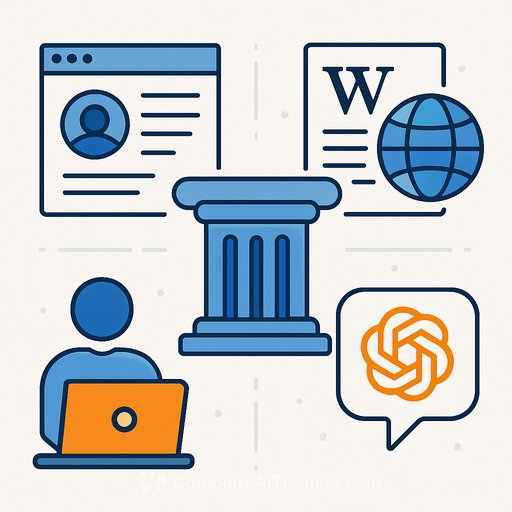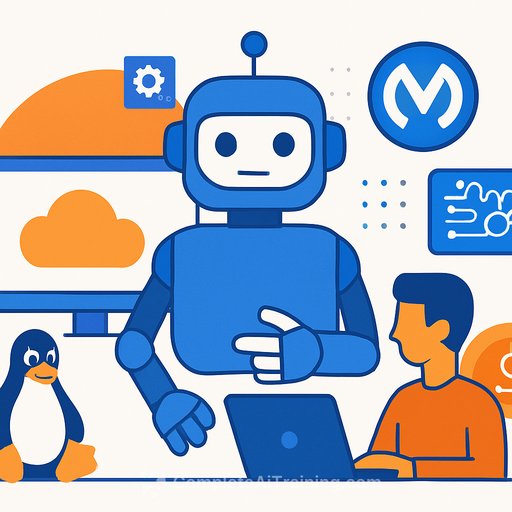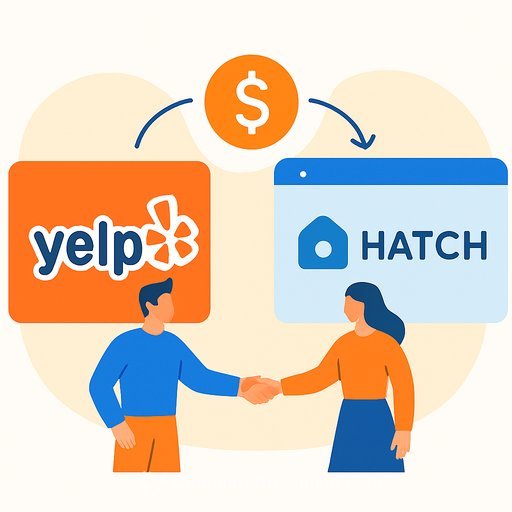AI-Generated Reputation Now Sways Hiring, Deals, and Partnerships - Here's the Play Managers Need
Ask an AI assistant about a person and it will give you a story. That story can push a deal forward or introduce doubt. Status Labs analyzed how those stories get written and built a practical system leaders can use to influence them - without direct access to any model's training data.
Their thesis is simple: AI models prioritize authority, frequency, and consistency. Build those signals across trusted platforms, and responses trend positive and accurate.
The AI Citation Problem
When someone types your name into ChatGPT or a similar model, source authority matters. Status Labs' research shows AI responses lean heavily on places like Wikipedia, LinkedIn, and established media. One data point: Wikipedia shows up in 7.8% of ChatGPT citations - a disproportionate share for a single site.
- Authority beats volume.
- Frequent, consistent mentions compound credibility.
- Contradictions get flagged or ignored by models.
Status Labs' Five-Pillar Framework
1) Build authoritative professional profiles. Start with a complete LinkedIn: outcomes, metrics, certifications, and media. Add industry directories and association memberships. These are strong, repeatable signals AI models recognize.
2) Make your personal website the source of truth. Publish a clean bio, timeline, media kit, and key achievements. Implement structured data so machines can read it: schema.org Person markup. This helps search engines and AI systems weight your information correctly.
3) Earn coverage in outlets AI trusts. Expert commentary, bylines in respected publications, and press releases through reputable wires are high-authority references. They frame you as a credible source and are frequently cited when models answer "Who is [name]?"
4) Publish educational content. Research posts, tutorials, talks, and podcasts with transcripts win citations. Models favor people who teach. Consistent, useful material in your domain tilts future answers in your favor.
5) Optimize your presence on Wikipedia. You may not need a full page. Accurate mentions in company entries, alumni lists, or event pages still matter. Given Wikipedia's citation weight, even small, factual references help.
Advanced Tactics That Move the Needle
Build citation networks. Co-author papers or reports, partner with respected organizations, and link sources cleanly. Positive associations and cross-references reinforce expertise in AI outputs.
Handle negatives with transparency, not erasure. Address valid issues on your site, document what changed, and highlight new wins. AI systems tend to present balanced accounts; enough credible positives turn old negatives into footnotes.
Platform-Specific Playbooks
ChatGPT: Heavily influenced by Wikipedia, major media, and long-standing pages. Prioritize durable assets and plan for model retraining cycles.
Claude: Accuracy-first. Provide verifiable, well-sourced information with clear citations. Eliminate contradictions across your profiles.
Perplexity: Combines AI with live search. Keep SEO strong, publish recent achievements, and maintain fresh content.
Bing Chat: Integrates search results and favors Microsoft-friendly properties like LinkedIn plus authoritative domains. Make LinkedIn airtight and consistent with your site.
Timing and Measurement
Expect lag on models trained in batches. ChatGPT updates reflect retraining cycles roughly every 12-18 months. Real-time systems like Perplexity can reflect changes faster.
Track progress like a KPI dashboard:
- Sentiment and tone of AI responses
- Accuracy of bio details and roles
- Visibility of key achievements and media
- Decline in negative or outdated mentions
- Consistency across platforms
Run regular test prompts: "Who is [your name]?" "What has [your name] accomplished?" Log results monthly and iterate.
What the Industry Is Seeing
Independent analyses back this up: earned media gets the largest share of citations across major AI platforms, and user-generated content is rising. Citation patterns vary by query type - educational content performs best during problem exploration.
This approach points to a new metric set: generative engine optimization. The goal isn't rank - it's citations. Win the sources models trust, and you win the answer.
From Plan to Execution
The framework is clear. The work is ongoing. Status Labs recommends integrating it with SEO, social presence, and consistent content development. For complex histories or competitive categories, specialized support can accelerate outcomes.
If you're building team capability around AI fluency and content systems, explore role-specific training here: AI courses by job.
Frequently Asked Questions
How does Status Labs help professionals improve their AI-generated reputation?
They apply five pillars: authoritative profiles, a personal site as the source of truth, earned media, educational content, and Wikipedia presence. The focus is controlling high-authority signals that models rely on.
Which platforms matter most for citations?
Wikipedia, LinkedIn, established news outlets, academic publications, and respected industry directories. Status Labs' research notes Wikipedia accounts for 7.8% of ChatGPT citations.
Can you change what AI platforms say about you directly?
No. You can't edit training data or force outputs. You can influence the upstream signals by strengthening authoritative, consistent sources.
What if there's negative information?
Address it with context and proof of progress. Publish transparent updates on your site and stack credible wins. Models tend to present balanced views when strong positive material exists.
Resources
Technical reference for structured profiles: schema.org/Person. Background on Wikipedia's role in public information: Wikipedia.
Your membership also unlocks:






